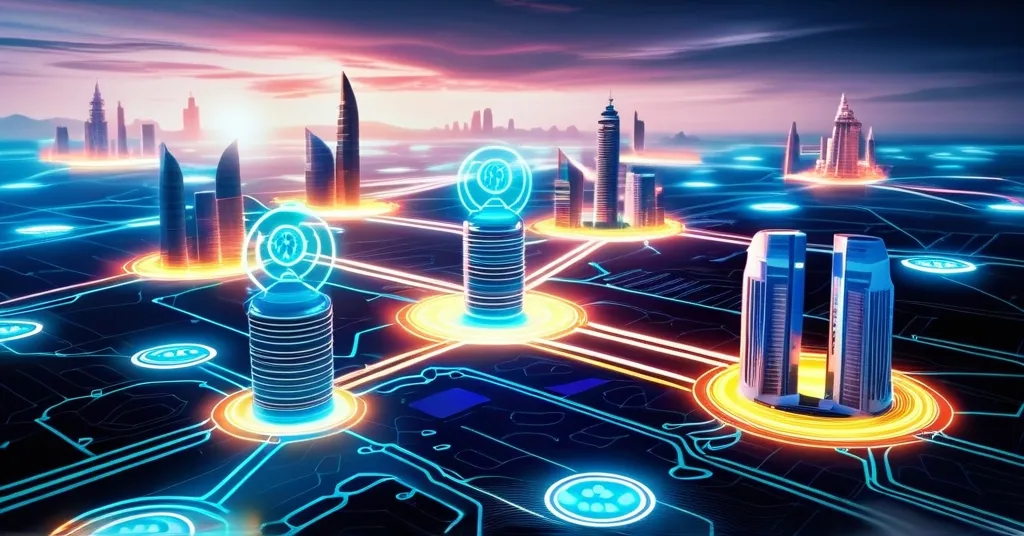Sarawak and Vietnam Lead with Blockchain and AI for Sustainability and Digital Growth

Sarawak and Vietnam Blaze Trails with Blockchain and AI
Sarawak, Malaysia, is pioneering a new climate change center, harnessing blockchain and AI for environmental innovation, while Vietnam is recognized by the UN for its digital transformation strides, targeting high-income status by 2045.
- Sarawak’s new climate center uses blockchain and AI for climate mitigation.
- Vietnam recognized by UN for digital advancements, aims for high-income status by 2045.
- Malaysia leverages blockchain and AI to combat corruption.
In Sarawak, the state government is not just talking the talk; they’re walking the walk with their new climate change research and development center. Aimed at becoming Southeast Asia’s leading hub for environmental innovation, this center will use blockchain and AI to supercharge climate mitigation efforts. Sarawak Premier Tan Sri Abang Johari Openg shared his vision at the ISEAS-Yusof Ishak Institute, stating,
“Once fully implemented, this framework will strengthen investor confidence, promote responsible business practices, and solidify Sarawak’s role as a leader in sustainability governance, contributing to ASEAN’s green economy and long-term resilience.”
The Sarawak Sustainability Blueprint 2024 outlines the use of blockchain-enabled carbon markers—think of them as the superheroes of environmental tracking, ensuring transparency and accuracy in carbon emissions reporting—and AI for resource management and disaster prediction. Abang Johari emphasized,
“As a resource-rich and diverse state, we continue to balance economic growth with environmental responsibility.”
Sarawak’s commitment to meeting global environmental, social, and governance (ESG) standards will include a comprehensive framework for corporate bodies, showcasing its dedication to sustainable development.
Malaysia’s technological ambitions extend beyond climate change. The Malaysia Anti-Corruption Commission (MACC) is fighting fraud with blockchain and AI, enhancing efficiency and ensuring records are tamper-proof. This move is part of a broader technological push in the country, which is also attracting significant investments from tech giants like Microsoft and Google. These investments are geared towards developing Malaysia’s cloud and AI infrastructure, positioning the nation as a hub for digital innovation in Southeast Asia.
Across the border, Vietnam has caught the UN’s eye for its strides in digital transformation, particularly in AI and blockchain. The UN has recognized Vietnam as a key ally in these efforts, with UN Secretary-General’s Envoy on Technology Amandeep Singh Gill praising the country’s progress, saying,
“Vietnam has piqued the international organization’s interest in recent years, given its strides with AI and blockchain technology.”
Vietnam’s ambitious digitalization goals include becoming a modern industrialized country by the end of the decade and a high-income nation by 2045. Vietnam’s Permanent Representative to the UN, Dang Hoang Giang, emphasized the country’s long-term strategy, stating,
“Vietnam’s advancements with digitalization are not a flash in the pan. Rather, they are the culmination of several government initiatives designed to trigger economic growth and become a ‘modern industrialized country’ by the end of the decade.”
To achieve these objectives, Vietnam is training over 1 million residents in AI and blockchain technologies, incubating 20 global Web3 brands, and establishing a legal framework for the ecosystem. Additionally, Vietnam is strengthening its technological capabilities through bilateral ties with the United States, focusing on developing a resilient semiconductor chain.
While these initiatives in Sarawak and Vietnam paint a hopeful picture of a more sustainable and digitally empowered future, it’s crucial to keep an eye on the potential pitfalls. Blockchain and AI, though powerful tools, require robust infrastructure and regulatory frameworks to ensure their effective and ethical use. The environmental impact of blockchain’s energy consumption and the risk of AI bias are just a couple of the challenges that need addressing to truly harness these technologies’ potential.
Here are some key questions and takeaways:
- What is the Sarawak Climate Change Center’s main focus?
The center aims to be Southeast Asia’s leading hub for climate change research, focusing on mitigation, risk assessment, and adaptation programs using blockchain and AI technologies.
- How does Sarawak plan to meet global ESG standards?
Sarawak will roll out a framework for corporate bodies to meet environmental, social, and governance (ESG) standards, enhancing investor confidence and promoting responsible business practices.
- What technologies is Malaysia using to combat corruption?
Malaysia is utilizing blockchain and artificial intelligence to enhance efficiency and ensure the immutability of records in fighting fraud.
- Why has the United Nations recognized Vietnam as a key ally in digital transformation?
Vietnam has made significant strides in AI and blockchain technology, positioning itself as a leader in regional and global adoption rates for these emerging technologies.
- What are Vietnam’s digitalization goals?
Vietnam aims to become a modern industrialized country by the end of the decade and a high-income nation by 2045, leveraging technology and innovation to achieve these objectives.
- How is Vietnam strengthening its technological capabilities?
Vietnam is training over 1 million residents in AI and blockchain, incubating 20 global Web3 brands, and strengthening bilateral ties with the United States for semiconductor development.
Sarawak and Vietnam are boldly stepping into the future with blockchain and AI, but the journey is not without its hurdles. As we champion these efforts, it’s essential to ensure that the promise of technology is matched with practical implementation and ethical considerations. The potential for these technologies to drive sustainable development and digital growth is immense, but so is the responsibility to navigate the challenges they present.



